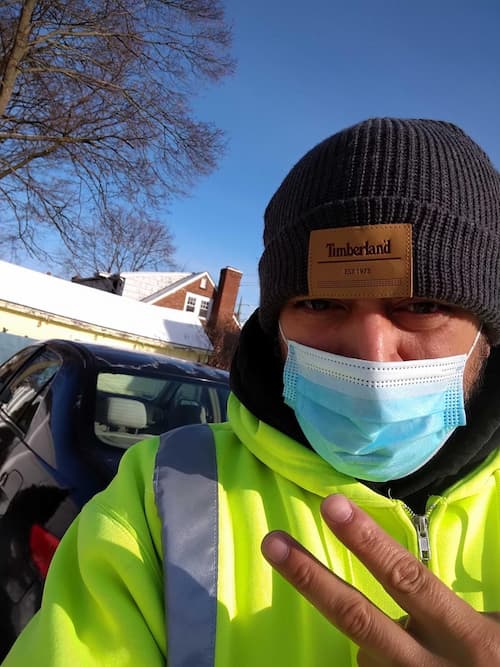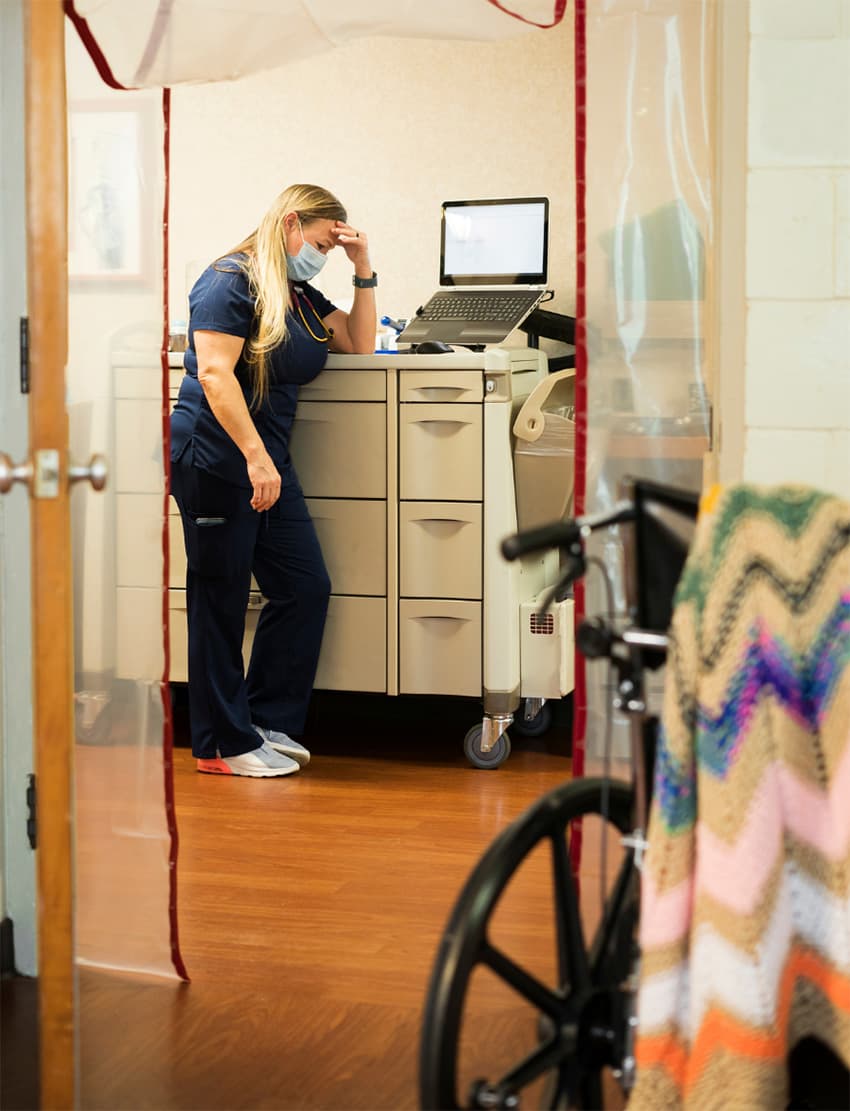The Mulligan Street Minutes
Winter 2022
Motivation & Mentorship:
What It Takes to Build a Future
It takes two flints to make a fire.
—Louisa May Alcott
Starting a business is a dream that many of us have at some point in our career. And over the years, countless FPM families have come to us with this goal already in mind. Sometimes it’s driven by the need for a flexible schedule—particularly important for single parents with young kids—but often it’s simply a desire to control their own fortunes. And as we know well, for employment (and income) to be stable in the long-term, people need to know that they are working toward a future that they have chosen.
Roberto, who entered our shelter with his young daughter in February 2020, had always dreamed of being his own boss, although he didn’t have a particular plan yet. When he lost his job due to COVID a month later, he began working as a delivery driver, logging as many trips as he could while his daughter was in school. And although the delivery lifestyle suited him, he needed something more stable, and better paying.

As fate would have it, 28 Freight/Truck Courier, one of our business sponsors, was looking for help. The owner, Rich Marks, was happy to take Roberto on as an independent contractor. He saw right away that “Roberto was a terrific person, focused on family. He was working hard, but like so many folks, wasn’t being fully rewarded financially for his effort.” There were a couple hurdles to leap however before Roberto could start: he needed his own delivery vehicle, and he needed to set up an LLC—in other words, his own business. Luckily, with the closure of our shelter rotation, we no longer needed our van to transport families. So last summer, we transferred ownership of the van to him, and his fledgling business took root.
Of course it wasn’t as simple as that. There was still the matter of the LLC to take care of, and it was clear Roberto would need help from someone with experience. Doug, a long-time supporter (and lucky husband of our director Sue) was eager to step up. They began meeting weekly to work through the details of starting his own delivery company. Right out of the gate, Doug could tell Roberto was “striving to succeed and create a stronger and more stable life for his family.” That kind of motivation was exactly what the project needed.

Doug was able to offer his years of experience in the logistics field to help Roberto define goals and targets to get his business up and running. At the same time, Rich was instrumental in helping Roberto come up with solutions to challenges in setting up the LLC and managing his start-up cash flow. With Doug’s steady mentorship, Rich’s eager support, and Roberto’s transparency and willingness to accept help, an incredible partnership emerged. Doug shared with us this week that “the progress Roberto has made these past couple of months is phenomenal; he just needed some guidance, organizational skills, and tools to help support him as he moved forward.”
A beautiful thing about mentoring is that it often flows both ways, and Doug certainly experienced that blessing: “I have seen his positive attitude, determination to succeed, eagerness to learn, and sense of humor when facing challenges…which have made me think about how I can change some of my own behaviors and thoughts. It’s truly a symbiotic relationship.” Rich has also been inspired by Roberto’s motivation and work ethic: “Working with Roberto has been such a positive experience in so many ways. He has done a terrific job—a delight to do business with in every way. His customer feedback is outstanding, and the team in dispatch has nothing but five-star reviews. He has earned our trust and is now earning an income that’s actually in line with his effort.”
When we asked Roberto if we could share this wonderful story of how he launched his dream, he wanted to make sure that we also included what Doug and Rich’s support has meant to him: “It has been a life changing experience, one of the best things that's ever happened to me. Without it I would have never gotten the right kind of discipline that it takes to own your own business. It’s been a great journey, but this is just the beginning.”
Starting a new business is a major undertaking. What this experience with Roberto made us realize, however, is that when a family is given the opportunity and support to embark on this path, they can reach far beyond what any of us imagined.
FPM Families on the Front Line
Families often come into our FPM programs with a passion for the medical profession. Some are already in the trenches, working as personal care assistants (PCA), certified nursing assistants (CNA), or Licensed Practical Nurses (LPN). Others are seeking the training programs and degrees that will usher them into this field. The need for medical workers has always been great, and many of our families have pursued this respected career path to make a difference in the lives of others.
The problem is, these roles rarely offer a sustainable wage. PCAs, an entry level position for people looking to get into the care field, only earn about $16 an hour, while CNAs, who require more training and stricter schedules, can earn closer to $20 per hour. LPNs, who must complete a rigorous, full-time, year-long certification program can make up to $30 an hour. Although a lucky few go on to nursing school to become registered nurses with competitive salaries, for most, the career progression plateaus at CNA or LPN.

What’s vital to understand is that, despite the critical need for these workers, neither position even comes close to making the “housing wage” needed to afford a two-bedroom apartment in greater Boston—currently $42 an hour. This is the hourly income that a full-time worker must earn to afford market rate housing in addition to other critical expenses, like food, utilities, and transportation.
What this means is that the people working these essential jobs—caring for hospital patients, nursing home residents, elderly folks in their own homes—can’t pay their bills without relying on a second job or extensive government subsidies. And the math is so precarious that sometimes they’re forced to turn down promotions because even a slight bump in salary will make their family ineligible for benefits that are worth more. This harsh inequity was never more apparent than during the COVID crisis. Workers in these professions were lauded for their bravery and commitment, yet forced to work brutal schedules for low pay, while putting their health on the line every day.
We had several of these dedicated, brave souls in our programs over the last two years. Margareth was working as a CNA when COVID first hit. “Covid was everywhere, and I didn’t know what to do,” she shared with us. “I was working the 3 to 11 pm shift and I was so scared to give the virus to my kids, I would come home, shower, change my clothes, then go get the kids from the babysitter, so I wasn’t picking them up until midnight.” Although Margareth was forced to leave her CNA role temporarily when her children’s school went remote, once things reopened, she found a new job, this time working as a CNA in the public school system that her children attend. “I am back in the medical field and I love it. Now that we have the vaccine, I feel a lot calmer.”

Another of our moms, Glenda, was also working as a CNA during the early months of the pandemic. Glenda shared how her already-challenging job became overwhelming due not only to the increased number of patients she had to manage, but also the “angry behavior from patients because they couldn’t have their families visit.” This “emotional burden” of her job became one of the most difficult aspects of the work. On top of that, Glenda was several months pregnant.
After the birth of her child, she was forced to stop working due to a lack of childcare. But she’s now back at it, picking up shifts where possible. “My plan is to go back in the medical profession long-term,” Glenda told us, “further my education and become a Registered Nurse. My heart has always been in the medical field and providing care for others in need. Although, it got difficult at times during this pandemic, I enjoyed learning things every day and facing new challenges.”
Since 2020, we’ve also supported one other CNA, an LPN, and a Medical Assistant in our programs, all of whom continued to work, sometimes two jobs, throughout the crisis. These women were part of the army of care that ensured our doctor’s offices stayed open, the school nurse offices were fully staffed, and vaccines got into our arms as quickly as possible.

There is no easy answer to the challenge of inadequate pay in these lower- and mid-level medical roles, but there are things we can do collectively to make a difference:
- First, recognize that these care providers are living and working in our communities, and that without them, we would lose essential services we all depend on.
- Second, through your own professional networks, keep your ears open for job opportunities in these professions that may be more sustainable, and let us know if you can provide referrals for our families.
- Third, help us build our resources and access to scholarships to support the parents who are ready to advance in their career. Many of our local partners like the MetroWest Health Foundation and the Metrowest Women’s Fund have made significant commitments to furthering education in the medical field and beyond.
- And last, perhaps most importantly, make sure that families in these professions have access to homes they can afford so they can stay in these essential jobs. Supporting local initiatives, like the Community Preservation Act or an affordable housing project, helps promote thoughtful development and ensure that everyone can live in or near the communities where they work.
We know that all the medical workers we’ve served at FPM over the last couple of years want to remain on this career path. They are fierce in their desire to help others, and we are all blessed by their incredible dedication. As a community, we must ensure that they have the resources and support they need to succeed.
Steps to Success: A Program Update
In 2015, housing costs were skyrocketing across our region. At the same time, the length of stay in our shelter began to steadily increase as families were forced to stay longer in order to save enough money to secure an apartment. It was clear that we needed to do more to help our parents improve their income to make sustainable housing a reality.
The Steps to Success program was conceived and launched that year to provide additional support in helping parents build employment skills, access job opportunities, and pursue professional training. In the early years, we focused on building an employer network and getting families placed in professions with a steady income and room for growth.
But there was a problem: once families built up their income enough to move out of shelter, they were often forced to relocate out of the area due to housing costs…leaving their new jobs behind.

Although educational support had always been an aspect of the program, this trend of having to secure new jobs all over again in their new homes led us to a realization: we needed to focus more on education—on building skills that would travel with our families and improve their job prospects wherever they went.
We’ve since reframed the Steps to Success program to be primarily an education-based initiative, rather than jobs placement. We’ve enhanced our subsidies and one-on-one support to promote educational pursuits for our parents, created a scholarship program for adults and teens pursuing advanced education, established a tutoring program for learners of all ages, and have continued building partnerships with other organizations that offer educational support as a means to break the cycle of poverty. We’ve also added classes in financial literacy and good tenancy to build up the foundational skills that increase long-term stability.
In addition, two other newer programs have fallen under Steps to Success’ umbrella: our Parent Empowerment group, which we are offering in partnership with SPARK Kindness, and the I Am King program for middle school boys, a collaboration with the He Is Me Institute. While these programs aren’t technically “professional” trainings, including them in our Steps to Success offerings underlines the undeniable connection between building confidence and empowerment, and having successful long-term education and employment outcomes.

We are also in the early stages of researching mentorship in response to the success we witnessed with Roberto (see above!), to learn more about how to set up a formal mentoring service for our families. Stay tuned for this exciting development in the coming months!
While of course the ultimate aim of the Steps to Success program is stable employment with a sustainable income, these offerings are critical steps to help our families achieve this goal. We know that by supporting parents and children in building their skills and confidence, we can help them reach beyond poverty and create independent and happy futures.